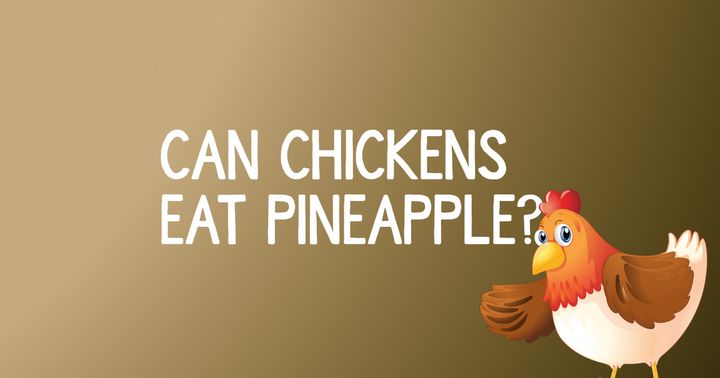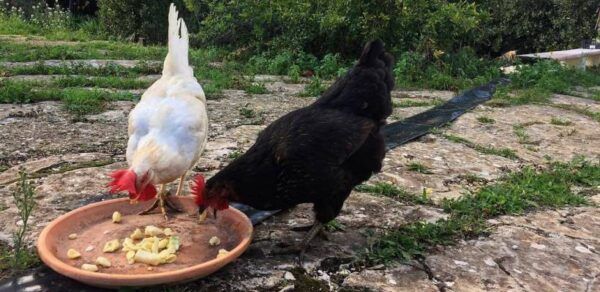Can Chickens Eat Pineapple?


Chickens aren't typically fussy with their diet and they'll often eat whatever they can find around the coop, so caring owners enjoy feeding them a large variety of different foods. Much like a dog who enjoys eating food off of their owner's plates, chickens will most likely always enjoy what you give them to try.
So, what if you have some pineapple lying around that you want to try feeding to your chickens? It's always worth searching whether your chickens eat certain foods to ensure that you don't unintentionally make them ill. No owner wants to compromise the health of their livestock, so don't feed them anything without checking beforehand.
In this article, we'll be answering the most pressing question about whether you can feed chickens pineapple, as well as outlining a few more facts that are beneficial to know.
Table Of Contents
Is Pineapple Safe for Chickens?

The good news is that yes, pineapples are safe for chicken consumption! However, it of course needs to be fed to them in moderation. The pineapple should be fresh and not frozen or expired, and you should prepare it quite soon before feeding it to your chickens.
The outer part of the pineapple, with all the spikes, should be removed fully to ensure that your chickens aren't consuming too much tough fiber. Don't throw all of your chicken feed out right away, though, as pineapple should only be given as a treat and is not suitable for everyday feeding.
Now that we've answered your burning question, let's have a look at why you should consider implementing pineapple into your chicken's diet.
Health Benefits
All types of fruit are incredibly healthy for humans and animals alike, so it stands to reason that pineapple is a portion of healthy food for chickens. Pineapple is a food full of vitamins and minerals that can benefit the chicken's body in a number of ways.
For starters, the vitamins and minerals found within the pineapple are great for birds' immune systems. Your chickens will experience a boost in their health and wellbeing, and you will be able to reap the rewards of high-quality meat and eggs.
Moreover, the chickens will grow more impressively and quicker than if they were to be malnourished. You'll also be less likely to have to treat illnesses that compromise the quality of your produce.
Pineapple offers more benefits than just boosting the immune system! They're full of bromelain, which is a proteolytic enzyme that helps to boost healthy digestion. Bromelain has anti-cancer, -clotting, and -inflammatory properties, all of which ensure that your chickens remain in good health. If you're planning on selling them, excellent health is a big benefit for you to use when pricing them.
Pineapples contain zero saturated fat which means that your poultry won't be at risk of suffering from obesity if they eat them. What's more, pineapple helps to prevent arthritis and worms in chickens! With all of these health benefits, it's a wonder why more people don't feed their chickens pineapple regularly.
How Much Pineapple is Too Much?
Having said that, you need to know when enough is enough. Although there are plenty of health benefits included with the consumption of pineapple, the fruit is also high in fructose, which is another way of saying sugars. Too much sugar in your chicken's diet can cause all sorts of issues, so it's important to always feed your chicken pineapple in moderation.
Feeding your chicken too much sugar in a short amount of time might increase the chances of weight gain, which can both lead to health complications and less egg production. For this reason, you should limit yourself to feeding your chickens up to three servings of pineapple a week. Remember, it is a treat and shouldn't be indulged every day.
We would advise you to test a small piece of pineapple on each of your chickens for the first time that you're introducing it to them. While the majority of chickens are not fussy when it comes to food, this doesn't automatically mean that your entire flock is going to love the taste of pineapple.
Instead, some chickens will take one look at the fleshy fruit and turn their beaks up at it. If you're not monitoring the pineapple consumption, one of three things could happen. The first is that it is left to rot. The second is that another chicken could come along and eat it, therefore consuming too much.
The third option is that the pineapple could be left by chicken A, become rotten, and then get eaten by a clueless chicken B. Not only would chicken B be at risk of obesity, but they'd also be eating rotten fruit which could lead to even more health problems. To avoid this from happening, make sure that all of your chickens like pineapple before leaving it for them.
Moreover, check back within a couple of hours to see if all the pineapple has been consumed. If there are still pieces leftover, make sure that you dispose of them as soon as possible. You wouldn't leave rotting food on the floor of your house, so don't subject your poultry to it, either.
How to Give Chickens Pineapple
Only give the chicken food that you'd like to eat yourself, so this means no expired pineapple or fruit that is not ripe yet, or too ripe. If you wouldn't eat the pineapple for a reason to do with its quality, we'd suggest that you put it in the trash rather than in your chicken's coop. Under or overly ripe fruit won't necessarily harm your chicken, but they won't like the taste of it so you might be left with rotting fruit lay around that you need to clean up.
Once you have determined that the quality of the pineapple is good enough for your chickens to eat, you should then cut it up into small pieces so that it is easy enough for your chickens to consume. Chunks of pineapple will be easy for them to eat, so you don't have to grate or mash it up.
Alternatively, dried pineapple is a good snack idea because it does not expire as easily as fresh pineapple and it is already broken down into small pieces that are easily consumed. Having said this, bear in mind that a chicken doesn't have teeth to bite their food with.
Due to their lack of teeth, chickens might find eating dried pineapple more difficult than it should be. To avoid your chickens become distressed because of their eating capabilities, make sure that you tear the dried pineapple into smaller pieces than the fresh pineapple cubes.
The coarse texture of dried pineapple can hurt the chicken's mouth, so another alternative is to soak the dried pineapple in water before feeding it to your flock. Putting moisture back into the pineapple can make it more manageable and therefore your chickens are more likely to eat all of it and not leave it wasted.
If you store the pineapple in a cool and dry place until you're planning to feed your chickens and soak the fruit just beforehand, you can still benefit from the additional shelf life of the pineapple while mimicking the feeling of feeding your birds fresh pineapple. We'd consider this a win-win for both you and your chickens!
Final Say
To answer your original question, yes, chickens can eat pineapple and the fruit actually offers some pretty impressive health benefits to your poultry. Pineapple can work to protect your chickens from cancer, arthritis, and skin conditions.
However, pineapple is meant to be enjoyed in moderation and overindulgence can reverse the health benefits and actually compromise the health of your flock. For this reason, we'd recommend that you monitor your chickens' consumption of pineapple.
There are many ways in which you can feed pineapple to chickens, just make sure that you offer it up in small pieces so that it is easy for them to eat. Dried pineapple could be an excellent option if you're worried about your pineapple expiring before you get a chance to use it all.

